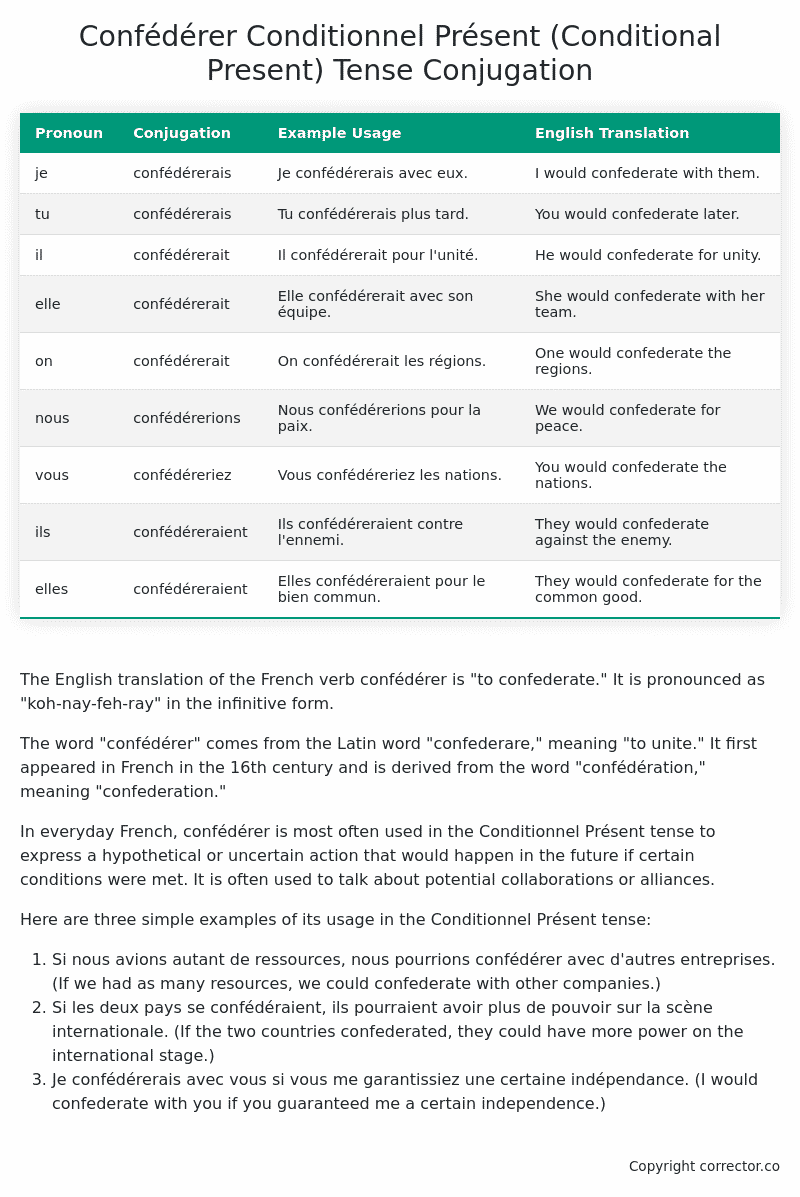Conditionnel Présent (Conditional Present) Tense Conjugation of the French Verb confédérer
Introduction to the verb confédérer
The English translation of the French verb confédérer is “to confederate.” It is pronounced as “koh-nay-feh-ray” in the infinitive form.
The word “confédérer” comes from the Latin word “confederare,” meaning “to unite.” It first appeared in French in the 16th century and is derived from the word “confédération,” meaning “confederation.”
In everyday French, confédérer is most often used in the Conditionnel Présent tense to express a hypothetical or uncertain action that would happen in the future if certain conditions were met. It is often used to talk about potential collaborations or alliances.
Here are three simple examples of its usage in the Conditionnel Présent tense:
- Si nous avions autant de ressources, nous pourrions confédérer avec d’autres entreprises. (If we had as many resources, we could confederate with other companies.)
- Si les deux pays se confédéraient, ils pourraient avoir plus de pouvoir sur la scène internationale. (If the two countries confederated, they could have more power on the international stage.)
- Je confédérerais avec vous si vous me garantissiez une certaine indépendance. (I would confederate with you if you guaranteed me a certain independence.)
Table of the Conditionnel Présent (Conditional Present) Tense Conjugation of confédérer
| Pronoun | Conjugation | Example Usage | English Translation |
|---|---|---|---|
| je | confédérerais | Je confédérerais avec eux. | I would confederate with them. |
| tu | confédérerais | Tu confédérerais plus tard. | You would confederate later. |
| il | confédérerait | Il confédérerait pour l’unité. | He would confederate for unity. |
| elle | confédérerait | Elle confédérerait avec son équipe. | She would confederate with her team. |
| on | confédérerait | On confédérerait les régions. | One would confederate the regions. |
| nous | confédérerions | Nous confédérerions pour la paix. | We would confederate for peace. |
| vous | confédéreriez | Vous confédéreriez les nations. | You would confederate the nations. |
| ils | confédéreraient | Ils confédéreraient contre l’ennemi. | They would confederate against the enemy. |
| elles | confédéreraient | Elles confédéreraient pour le bien commun. | They would confederate for the common good. |
Other Conjugations for Confédérer.
Le Present (Present Tense) Conjugation of the French Verb confédérer
Imparfait (Imperfect) Tense Conjugation of the French Verb confédérer
Passé Simple (Simple Past) Tense Conjugation of the French Verb confédérer
Passé Composé (Present Perfect) Tense Conjugation of the French Verb confédérer
Futur Simple (Simple Future) Tense Conjugation of the French Verb confédérer
Futur Proche (Near Future) Tense Conjugation of the French Verb confédérer
Plus-que-parfait (Pluperfect) Tense Conjugation of the French Verb confédérer
Passé Antérieur (Past Anterior) Tense Conjugation of the French Verb confédérer
Futur Antérieur (Future Anterior) Tense Conjugation of the French Verb confédérer
Subjonctif Présent (Subjunctive Present) Tense Conjugation of the French Verb confédérer
Subjonctif Passé (Subjunctive Past) Tense Conjugation of the French Verb confédérer
Subjonctif Imparfait (Subjunctive Imperfect) Tense Conjugation of the French Verb confédérer
Subjonctif Plus-que-parfait (Subjunctive Pluperfect) Tense Conjugation of the French Verb confédérer
Conditionnel Présent (Conditional Present) Tense Conjugation of the French Verb confédérer (this article)
Conditionnel Passé (Conditional Past) Tense Conjugation of the French Verb confédérer
L’impératif Présent (Imperative Present) Tense Conjugation of the French Verb confédérer
L’infinitif Présent (Infinitive Present) Tense Conjugation of the French Verb confédérer
Struggling with French verbs or the language in general? Why not use our free French Grammar Checker – no registration required!
Get a FREE Download Study Sheet of this Conjugation 🔥
Simply right click the image below, click “save image” and get your free reference for the confédérer Conditionnel Présent tense conjugation!

Confédérer – About the French Conditionnel Présent (Conditional Present) Tense
Formation
Common Everyday Usage Patterns
Expressing Polite Requests
Expressing Hypothetical Situations
Expressing Doubt or Uncertainty
Interactions with Other Tenses
Present Tense
Past Tense
Future Tense
Conditional Perfect
Summary
Want More?
I hope you enjoyed this article on the verb confédérer. Still in a learning mood? Check out another TOTALLY random French verb conjugation!


